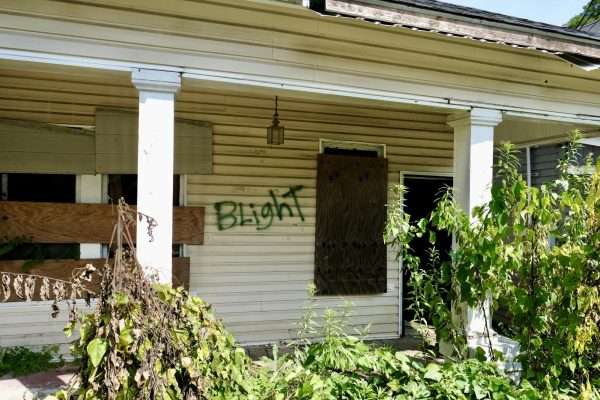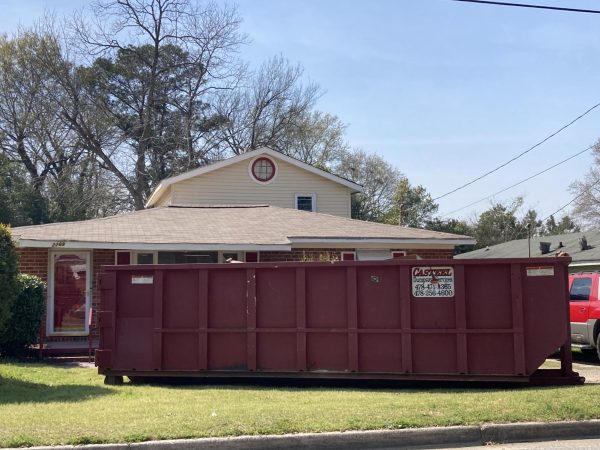Critics say Georgia bill intended to ease school library book bans a ‘slippery slope’
Ross Williams/Georgia Recorder
Students walk past the library at Forsyth Central High School.
A bill aimed at making it easier for Georgia parents to have books banned from their school libraries earned Republican support in a state House subcommittee meeting Tuesday.
Under Dallas Republican Sen. Jason Anavitarte’s Senate Bill 226, which passed his chamber last year but never came to a House vote, parents who believe school materials to be obscene would be able to report them to the school’s principal or their designee, who would have 10 days to determine whether the material is harmful and should be banned. Parents unhappy with the answer could appeal to the school board.
Now, trained school librarians largely control what resources children can access on their bookshelves and computer screens, but a standard approach would give parents more control, Anavitarte said.
“The policies set up by local school districts sometimes can vary from school district to school district and not be totally transparent and not be totally clear, so I think what we were trying to do is basically create a process that the public would understand in terms of where to go if there was a concern with material, and basically how to go about that process so the community would have full understanding of the transparency rules of engagement with the school board,” he said.
Waycross Republican Rep. James Burchett said constituents tell him their concerns go unheard.
“We’ve had instances where a parent may come in and say ‘I’m not sure this is adequate or correct for my third grader,’ and then it sits on somebody’s desk for six months or a year and doesn’t get handled,” he said. “So essentially, we’re just putting in a set of guidelines so that someone in any community in the state of Georgia will have a determination of when they’re going to have their due process to determine if it is correct, or right, or obscene, or not obscene for their child.”
Gov. Brian Kemp listed banning obscene items from schools as one of his educational priorities for the 2022 election-year session.
School board meetings have become the latest battle ground in the culture wars, with most of the fireworks centered on the idea of teaching so-called critical race theory in classrooms.
Sandy Springs Democrat Josh McLaurin said he worries phrases like “parental input” are a cynical way of laundering culture war clashes into the education system.
“We’re using somewhat neutral or sort of benign sounding phrases to cover up for something a little worse,” he said, “which is a more reactive, less informed, basically manifested distrust for what our public schools are doing, and creating duplicative, redundant legal mechanisms that provide parents — some parents, not all parents — with an opportunity to use school resources to chill teachers, librarians, media technicians, into not providing a full, diverse body of literature and education for public school students.”
Terrence Wilson, an attorney representing the Intercultural Development Research Association, said any materials banned are likely to represent people from minority groups.
“We’re concerned that under the current processes proposed in this bill, materials that cover topics from minority perspectives and that explain and address themes including racial and ethnic minorities, LGBTQ+ individuals and religious minorities may be removed or censored,” he said. “We’ve seen this happen in other places that have enacted similar provisions to the ones in this bill.”
Professional Association of Georgia Educators spokeswoman Margeret Ciccarelli said her organization generally supports parental involvement in school activities, but they are concerned about potential copyright issues. In its current form, the bill requires portions of works in question to be posted online for parents to review, which could cause schools to unintentionally violate the author’s copyright.
Others have concerns over censorship, including Richard T. Griffiths, president emeritus of the Georgia First Amendment Foundation.
“Very often, the greatest ideas that bring the most societal change at one point started off as unpopular ideas, and for ideas to be restricted because one parent or 10 parents disagree with them doesn’t mean that they should be restricted from the other students in the school,” he said. “It’s a very dangerous, slippery slope, to go down.”
“These books have been curated by professional librarians who give so much in their communities to carefully choosing books that meet the needs of the students and the communities that they serve,” he added. “There’s nothing to stop parents from seeking the advice of those librarians to seek appropriate material for those children without shutting off access to others.”
Georgia Recorder is part of States Newsroom, a network of news bureaus supported by grants and a coalition of donors as a 501c(3) public charity. Georgia Recorder maintains editorial independence. Contact Editor John McCosh for questions: [email protected]. Follow Georgia Recorder on Facebook and Twitter.
See the original story here.

























